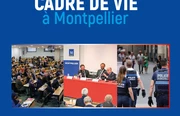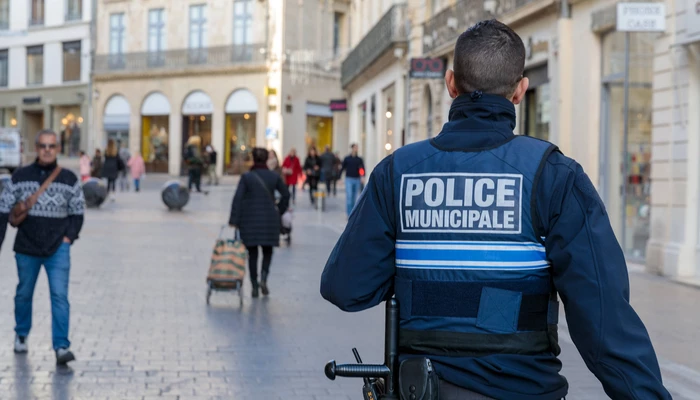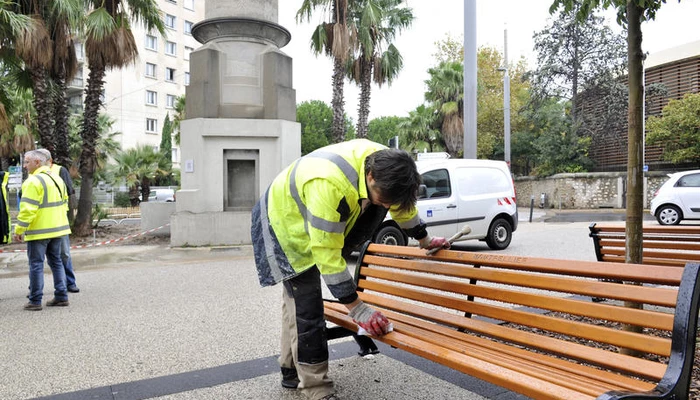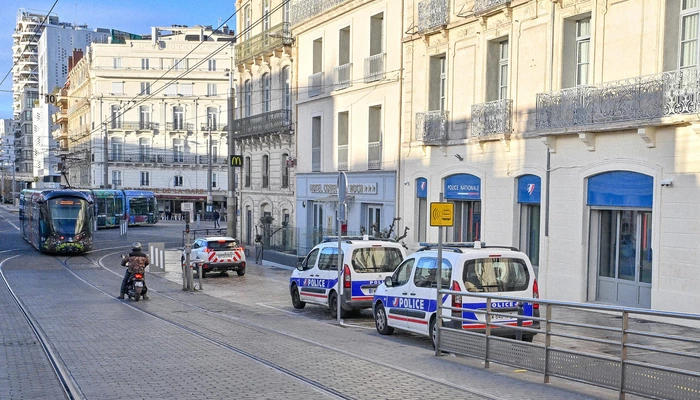The Local Security and Crime Prevention Council (CLSPD) is at the heart of this strategy, ensuring effective coordination of preventive actions. Its Observatoire Local de la Tranquillité Publique (OLTP) collects and analyzes data to guide actions.
Among the mission's flagship actions are early prevention schemes, victim assistance, local social mediation, addiction prevention, support for specialized prevention associations and recidivism prevention.
Finally, 3 reception agents attached to the Mission Prévention de la Délinquance work in two Maisons de Justice et du Droit.
Local Security and Crime Prevention Council (CLSPD)
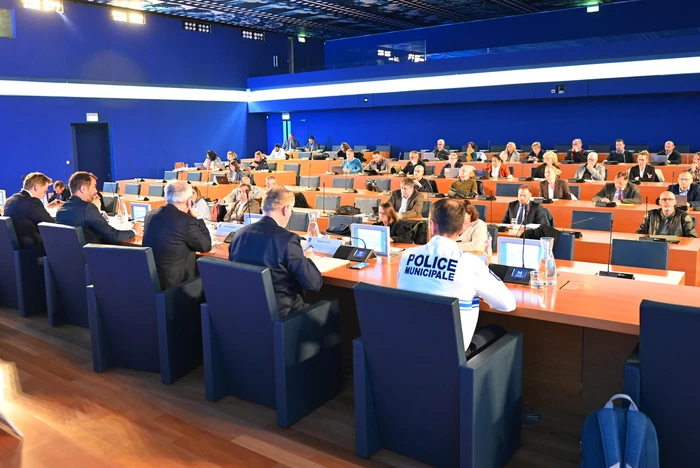
What is the CLSPD?
The Conseil Local de Sécurité et de Prévention de la Délinquance (CLSPD) is a coordination and consultation body for local institutions and partners. Its aim is to prevent and combat delinquency by promoting public tranquility and social cohesion.
Main missions
The primary mission of the CLSPD is to draw up a territorial security and delinquency prevention strategy. This three-year action plan guides the initiatives to be implemented to address issues of public safety and tranquility.
Functioning
The CLSPD is chaired by the Mayor of Montpellier, and meets in plenary session at least once a year to define general safety guidelines. In addition, monthly operational meetings are organized as part of specific working groups, focusing on particular themes or situations.
Consultation and monitoring bodies
To ensure local monitoring, the CLSPD has several bodies:
- Plenary Assembly: annually sets the broad guidelines for security and delinquency prevention policies.
- Restricted Committee: chaired by the deputy mayor in charge of public protection, it meets to coordinate the implementation of decided actions.
- Cellules de Veille plénière: present in each district, they ensure regular consultation between local players to meet the specific needs of each territory.
- Groupes d'Actions et de Suivi à Vocation Thématique (GSAVT): temporary working groups are set up to deal with specific, urgent situations, in direct liaison with the relevant departments.
Actions and collaborations
The CLSPD carries out its actions in partnership with local institutions and associations, facilitating the cross-fertilization of skills for tailored responses. This arrangement makes it possible to share information, tailor actions to the specific needs of neighborhoods, and monitor the progress of incidents in real time.
Initiatives and surveys on feelings of insecurity
To gain a better understanding of residents' concerns, the Mission Prévention de la Délinquance has carried out two surveys on feelings of insecurity in the city center, in collaboration with the Faculty of Law and Political Science and the Forum Français pour la Sécurité Urbaine (FFSU).
These studies aim to refine safety policies based on feedback from users and local players.
In 2022, a symposium on safety and the living environment was organized to share the results of these surveys and strengthen dialogue with the population.
Local Public Tranquillity Observatory (OLTP)
The Observatoire Local de la Tranquillité Publique, created in 2008, is a tool for monitoring and evaluating delinquency and incivilities. It responds to a need expressed as early as 2001 in the Local Security Contract: to gain a better understanding of security issues in order to adapt local responses.
OLTP missions
The OLTP collects, analyzes and maps incidents, offenses and disturbances to public tranquility on the communal territory. This networking, carried out with institutional and associative partners, enables "hot spots" to be identified and appropriate measures put in place. The observatory also contributes to active monitoring in the field, providing a geolocalized analysis of incidents to better guide prevention actions.
Objectives of the OLTP
- Collect and centralize information provided by partners on incidents, incivilities and offenses;
- Exchange and share this data between safety and prevention players ;
- Analyze delinquency trends to identify developments and sensitive areas;
- Ensure a watch and alert on hot spots, enabling a rapid and appropriate response;
- Evaluate CLSPD actions, to adjust interventions and improve the effectiveness of existing arrangements.
Leading prevention initiatives
The Délinquance Prevention Mission implements several early prevention schemes, with a particular focus on young people and families.
These actions focus on the Rappel à l'Ordre (RAO), the Conseil pour les Droits et Devoirs des Familles (CDDF), and the Transaction Municipale. 3 levers of intervention to raise awareness and frame behavior.
Discrimination and victim support

The Mission Prévention de la Délinquance has set up schemes to support victims of sexist harassment or acts of hate, such as the dispositif Angela.
Dispositif Angela
In order to combat street harassment and feelings of insecurity, strengthen solidarity and mutual aid, and increase protective measures in the public space, the City, in partnership with the Hérault Chamber of Commerce and Industry, has launched the Angela device.
The aim of this scheme is to create a network of private and public shelters, trained to welcome women being or feeling followed, insulted or threatened in the street.
Local social mediation
The City of Montpellier has set up a local social mediation scheme in the Mosson district, as part of the prevention battalions. This initiative, launched on an experimental basis, relies on the commitment of 6 local social mediators recruited specifically for this area.
The mediators' role is to respond to conflicts and tensions in the public space by acting directly with residents, with a view to prevention and regulation. Their mission focuses on listening, accompanying and directing residents to the appropriate structures (associative, institutional, etc.).
They are present in the field on a daily basis, and intervene in various strategic locations in the neighborhood, such as:
- Schools,
- Sports facilities,
- Local facilities (Houses for all, médiathèques, neighborhood town halls, etc.)
- Around the Mosson Cévennes Mission as part of the urban renewal project rollout
The mediators, through their continuous presence, are perceived as effective and trusted relays, helping to resolve conflicts and promote public tranquility.
Fighting addiction
The city supports local associations at festive events organized in the public space to raise public awareness of addictions and advice on reducing health risks.
As part of its actions to prevent addiction-related risks, the Mission Prévention de la Délinquance supports two local associations with funding and the supply of awareness-raising materials. These associations intervene directly in the public space, notably at festive events, to raise awareness among populations, particularly young people, of the dangers of excessive alcohol and drug consumption and the risks of transmitting sexually transmitted diseases (STDs).
The associations Avenir Santé 34 and the Comité de l'Hérault d'Éducation pour la Santé are thus present at festive events in Montpellier, including those aimed at students. Volunteers from the associations also offer advice and help to people facing alcohol or drug addiction problems, thus contributing to the reduction of public health risks.
Specialized prevention
The city of Montpellier actively supports specialized prevention, an essential mechanism for supporting young people in vulnerable situations. This program is the fruit of a tripartite agreement signed between the City, the Association APS34 and the Département, aimed at strengthening the impact of prevention actions carried out in the territory.
Objectives of specialized prevention
The main objective of specialized prevention is to prevent the risks of social maladjustment and marginalization of young people. It intervenes on several levels to:
- Facilitate the integration and social advancement of young people and families.
- Build educational and social pathways enabling young people to regain a positive dynamic and gain access to common law.
- Participate actively in neighborhood dynamics and social cohesion, by promoting dialogue between young people, institutions and families.
Prevention actions focus on priority city neighborhoods (QPV) as well as at-risk locations where difficulties of social maladjustment are manifest, including in rural areas.
Target audience
Mainly young people aged 11 to 25, in particular those who:
- Are in situations of fragility or marginalization, especially those who have refused or can no longer find suitable educational and social support.
- Have dropped out of school, are wandering, or are in the process of integration or training, often with a lack of family support and in a situation of precariousness.
- Present risky behavior in the public space, or form groupings in neighborhoods, whether local or from other cities.
Preventing recidivism: community service (TIG) and unpaid work (TNR)
The City of Montpellier actively supports the Public Prosecutor's penal policy, notably through the application of alternative measures to incarceration, such as Community Service (TIG) and Unpaid Work (TNR).
Community Service (TIG)
Community Service enables a convicted person to carry out unpaid work in lieu of prison. This measure is applied for certain offenses punishable by prison sentences or for minor offenses. The work can be carried out within a maximum period of 18 months following conviction.
Unpaid Work (TNR)
TNR is an alternative to prosecution for minors and adults. This scheme makes it possible to punish deeds through unpaid work carried out for the benefit of the community.
The City of Montpellier, in partnership with the CCAS, the Metropole and the services of the Protection judiciaire de la jeunesse, has set up a network of guardians to support these people in their reintegration.
Accompaniment and follow-up
- Orientation: the Mission Prévention de la Délinquance ensures that people on TIG or TNR are directed towards suitable assignments.
- Training: male and female tutors are trained to support people on the road to reintegration.
- Assessment and evaluation: regular monitoring is carried out, with milestones and ongoing evaluation of the commitment of individuals to their community service.
A concrete partnership
Since 2014, the City of Montpellier has been collaborating with the Hérault Territorial Department of Judicial Youth Protection to host minors required to carry out community service. This collaboration enables the City to offer missions to 2 to 3 young people per year in various municipal departments.
This initiative, in addition to participating in the rehabilitation of convicted persons, also aims to prevent recidivism and strengthen social ties.
Houses of Justice and Law
Receiving the public at Maisons de justice et du droit (MJD)
Access to rights is an essential pillar of delinquency prevention policies. In the Montpellier metropolitan area, two MJDs are open in Celleneuve and Lattes. Three reception officers, attached to the Mission Prévention de la Délinquance, work within these MJDs.
Objectives of the MJDs:
- Inform users about their rights, legal procedures, and the implementation of amicable dispute resolution methods (conciliation, mediation, etc.).
- Assist victims by offering them appropriate support, while meeting the needs of litigants in their legal proceedings.
- To provide a free, local judicial presence by putting citizens in touch with legal professionals, such as lawyers, legal advisors, or other specialized contributors.
The MJDs thus make it possible to offer a concrete response to the legal needs of citizens, particularly those experiencing difficulties in accessing justice, by guaranteeing a high-quality public service accessible to all.


